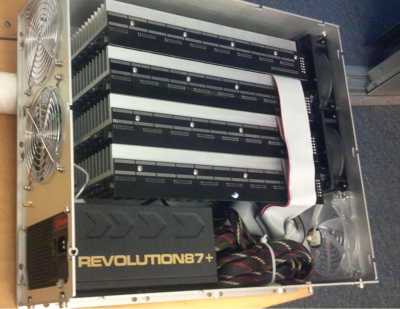| Hardware Mines Bitcoins Faster |
| Written by Mike James | |||
| Sunday, 03 February 2013 | |||
|
New hardware makes Bitcoins easier to mine, but are the ultimate winners the makers of the custom chips? The Bitcoin algorithm is a fascinating study in distributed control requiring computation to verify transactions. In return for the work, the verifiers or "miners" get to keep some new Bitcoins minted for just this purpose. This is a really clever idea and it is what bootstrapped the entire Bitcoin economy into existence without the need for banks or central control.
The idea is called "proof of work" and what happens is that to process a transaction you have to find a value that has a hash with a specified number of zeros. It turns out that this task takes time that is exponential with the number of zeros. This means that the Bitcoin algorithm can modify the difficulty of the task that must be completed before the miner is rewarded.
Bitcoin miners traditionally use GPUs to compute hashes as fast as possible, but GPUs are expensive and as general-purpose processors they are not the ultimate in hardware for computing hash values. Obviously, if you could get a big chip company to build a custom chip from scratch that computes hashes as fast as possible then you would have the edge on other miners - but this isn't likely to happen. An alternative is to use an ASIC (Application Specific Integrated Circuit), which is an integrated circuit that can be customized generally by modifying the way a set of standard "cells" work together. This is a cheaper way of creating a custom chp starting from blank silicon but it is still an expensive approach compared to say FPGA (Field Programmable Gate Arrays) which can be customized after manufacture by altering its configuration. This is what a Yifu Guo, head of BitSynCom LLC, has done by creating Avalon V1. This is a custom ASIC packaged into a frame with expansion slots. The system sells for just short of $1500 and it is roughly 50 times faster than a top end GPU mining system. The chip can compute 66Gh/s, i.e. Giga Hashes per second. You can see the system in this, admittedly not good, video:
Would you pay just short of $1500 to improve your Bitcoin mining operation? At the moment it is estimated that an Avalon would earn between $200 to $300 per day but this is a hotly disputed figure which depends on the current Bitcoin exchange rate and many other factors. This also ignores one of the more ingenious aspects of the Bitcoin proof of work algorithm. The algorithm checks to see what the average time to complete the proof of work is and adjusts the difficulty of the problem to make it stay roughly the same. If miners buy lots of Avalon machines then the first few early adopters will gain a larger share of the newly minted Bitcoins, but as the technique spreads the algorithm will adapt and make the problem more difficult. The end result of adopting Avalon is that the level playing field will be restored and the time to crack the hash problem will return to what it was. Of course, any miner without an Avalon machine will have no chance of competing. Put simply this is now a war not of software but hardware escalation - in other words this is the start, or perhaps continuation of a mining arms race. There are some other companies working on custom chips, so you can expect this to be the way to mine Bitcoins into the near future. More InformationRelated ArticlesBitcoin Hits 10.5 Million - Mining Payment Halves Bitcoin Idea Gets $500,000 funding Bitcoin still standing - but panic takes over Inside Bitcoin - virtual currency Bitcoin gains an open source client Digital currency lets GPU cycles print money To be informed about new articles on I Programmer, install the I Programmer Toolbar, subscribe to the RSS feed, follow us on, Twitter, Facebook, Google+ or Linkedin, or sign up for our weekly newsletter.
Comments
or email your comment to: comments@i-programmer.info
|
|||
| Last Updated ( Monday, 04 February 2013 ) |



